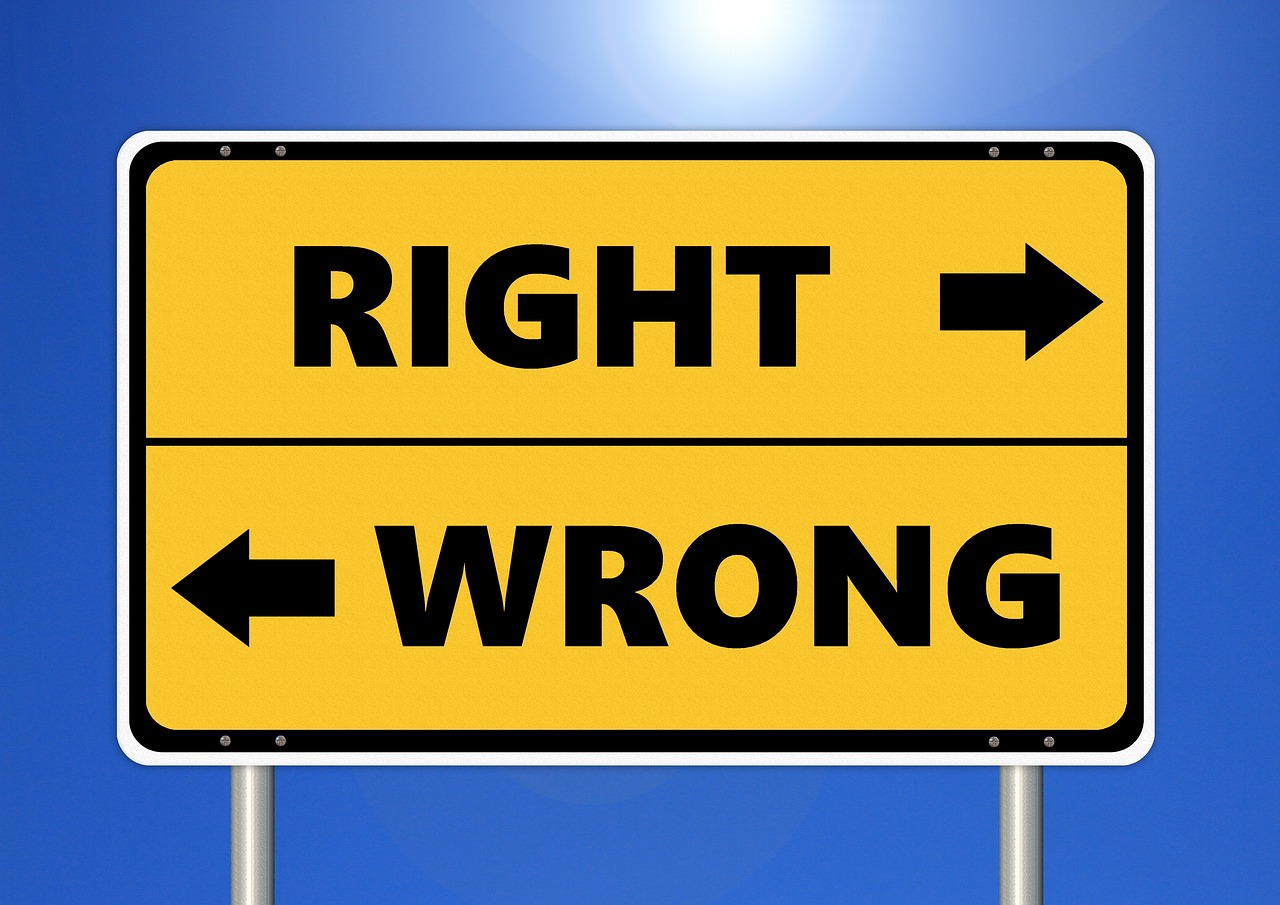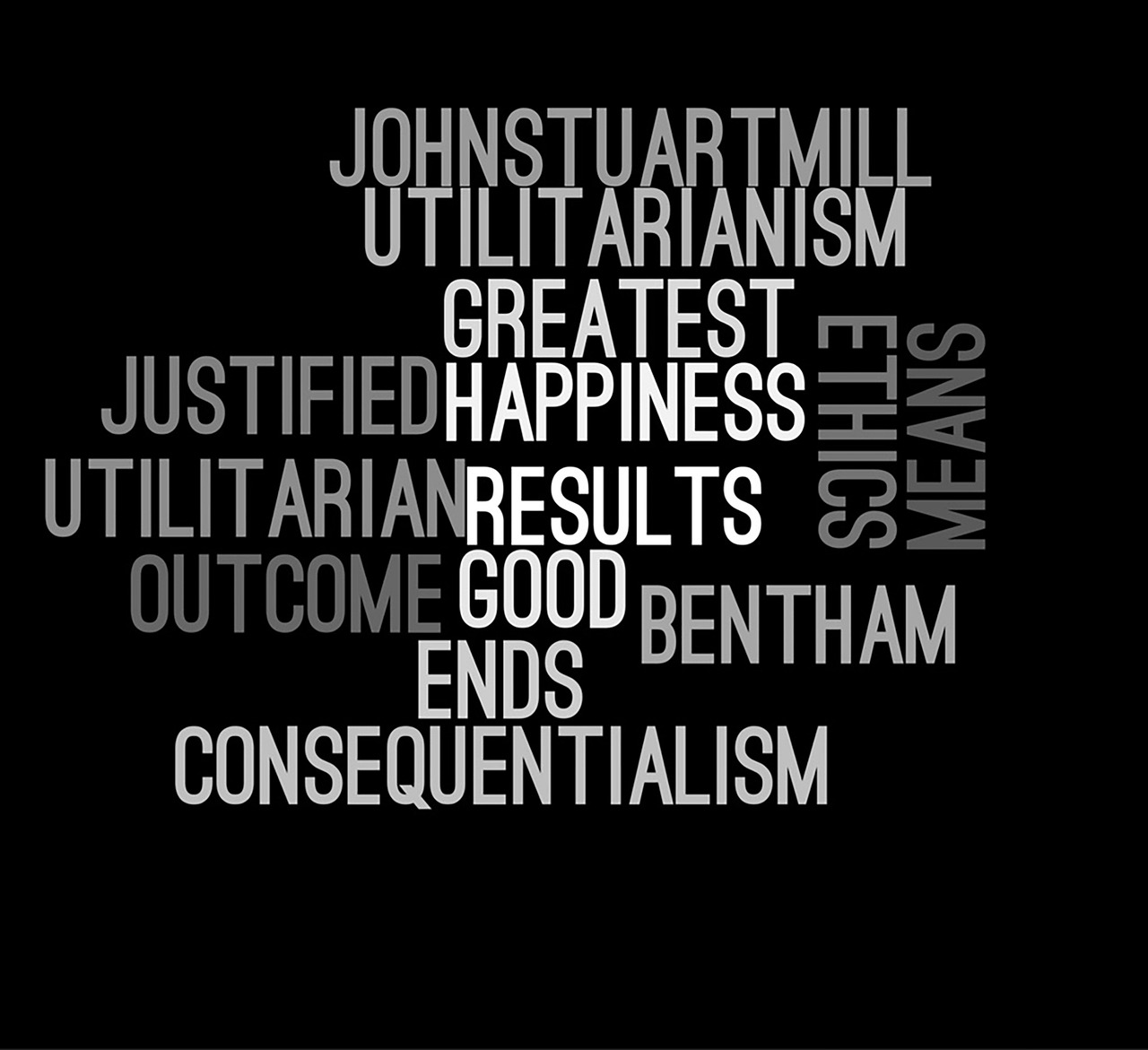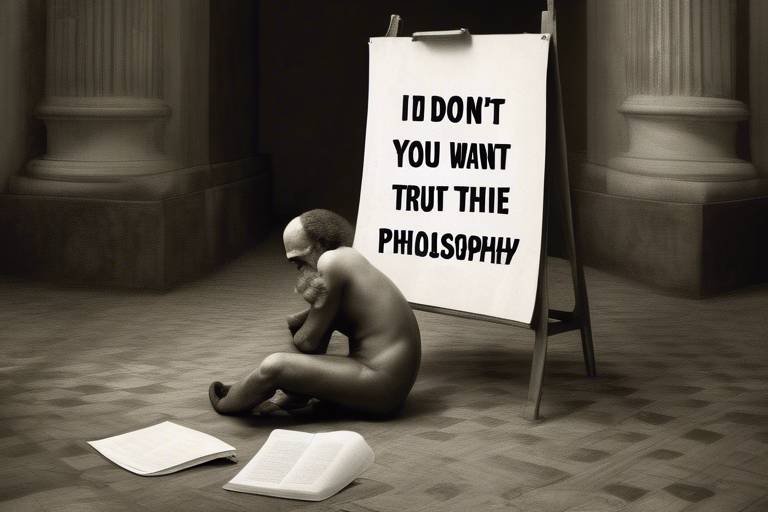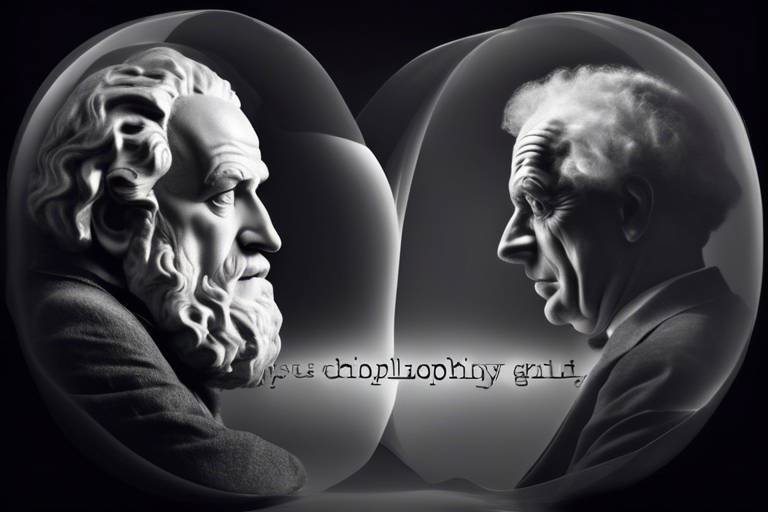Ethics and Morals - The Philosophical Boundaries
In the grand tapestry of human existence, the concepts of ethics and morals serve as the threads that weave together our understanding of right and wrong. They are not mere words; they are the very essence of how we navigate our lives, interact with others, and make decisions that can have profound impacts on ourselves and society at large. But what exactly do we mean when we talk about ethics and morals? Are they interchangeable, or do they represent distinct ideas that guide our behavior? This article delves into the intricate relationship between these two concepts, exploring their definitions, significance, and the philosophical debates that shape our understanding of what it means to be human.
At the heart of this exploration lies the recognition that both ethics and morals influence our daily choices. Whether you’re deciding how to treat a friend or contemplating larger societal issues, these frameworks guide your actions. Imagine standing at a crossroads, where one path is paved with ethical theories and the other with personal morals. Which way do you choose? This choice is not merely a matter of preference; it reflects deeper philosophical principles that can define communities and cultures.
As we embark on this journey, we will uncover how cultural and religious influences shape our moral compass, the role of secular morality in contemporary society, and the various ethical theories that provide frameworks for understanding moral dilemmas. By the end of this article, you will not only grasp the nuances between ethics and morals but also appreciate their significance in our lives.
Ethics is a branch of philosophy that examines what constitutes right and wrong behavior. It provides a framework for evaluating moral actions and guiding decision-making in various contexts. Think of ethics as the software that runs our moral hardware; it’s the systematic approach we use to make sense of complex situations where the right choice isn’t always clear. In a world filled with gray areas, ethics helps us navigate through the fog, offering principles that can clarify our thinking and guide our actions.
Morals refer to the beliefs and values that individuals hold regarding what is right and wrong. They are often shaped by culture, religion, and personal experiences, influencing behavior and societal norms. For instance, what one person views as a moral obligation might be seen as irrelevant by someone from a different cultural background. This diversity can lead to rich discussions and debates, but it can also create conflict. Understanding the roots of our moral beliefs is crucial in fostering empathy and respect among different groups.
Cultural influences play a significant role in shaping moral beliefs. Different societies have distinct moral codes, which can lead to varying interpretations of ethical behavior and judgments. For example, in some cultures, collectivism is valued over individualism, leading to different moral conclusions about actions that benefit the group versus the individual. This cultural lens highlights the importance of context when discussing morality.
Many individuals derive their moral values from religious teachings. This connection between religion and morality can create a strong sense of duty and ethical responsibility within communities. Religious texts often serve as moral compasses, guiding adherents in their daily lives. However, it’s essential to recognize that not everyone subscribes to a religious framework, which leads us to consider the role of secular morality.
Secular morality develops independently of religious doctrines. It emphasizes reason and human experience, advocating for ethical principles based on rational thought and collective well-being. This approach is increasingly relevant in our diverse world, where individuals seek to find common ground without the influence of religious beliefs. Secular morality encourages us to engage in dialogue about ethics, fostering a more inclusive understanding of right and wrong.
Various ethical theories provide frameworks for understanding moral dilemmas. These theories, including utilitarianism and deontology, guide individuals in making ethical decisions based on different philosophical principles. For instance, utilitarianism focuses on the outcomes of actions, advocating for those that maximize overall happiness, while deontology emphasizes the inherent morality of actions themselves, regardless of the consequences.
The debate between consequentialism and deontology highlights two fundamental approaches to ethics. Consequentialism focuses on the outcomes of actions, while deontology emphasizes the inherent morality of the actions themselves. This dichotomy raises important questions: Should we judge actions based solely on their results, or do the intentions behind those actions hold equal weight?
Utilitarianism is a form of consequentialism that advocates for actions that maximize overall happiness. It evaluates the moral worth of an action based on its consequences for the greatest number of people. Imagine a world where decisions are made with the aim of increasing happiness for the majority; while this sounds appealing, it can lead to ethical dilemmas where the needs of the few are sacrificed for the greater good.
Kantian ethics, a form of deontology, asserts that actions should be guided by universal moral laws. It emphasizes duty and the importance of treating individuals as ends in themselves, rather than means to an end. This perspective challenges us to consider the inherent value of each person and the moral implications of our actions, prompting deep reflection on how we treat others in our pursuit of ethical behavior.
- What is the difference between ethics and morals? Ethics refers to the systematic principles guiding behavior, while morals are the personal beliefs about right and wrong.
- Can morals change over time? Yes, moral beliefs can evolve due to cultural shifts, personal experiences, and societal changes.
- Why are ethical theories important? Ethical theories provide frameworks for understanding complex moral dilemmas, helping individuals make informed decisions.

Understanding Ethics
This article explores the intricate relationship between ethics and morals, delving into their definitions, significance, and the philosophical debates that shape our understanding of right and wrong.
Ethics is a branch of philosophy that examines what constitutes right and wrong behavior. It's not just a set of rules; it's a framework for evaluating moral actions and guiding decision-making in various contexts. Think of ethics as the compass that helps navigate the murky waters of human interactions. Without it, we might find ourselves adrift, making choices based on whims rather than principles.
At its core, ethics challenges us to ask the tough questions: What should we do? Why should we do it? And who gets to decide? These questions are not merely academic; they resonate in our daily lives. From deciding how to treat a friend to determining the right course of action in a business deal, ethics plays a crucial role. For instance, when faced with a dilemma, we often weigh our options against ethical standards, seeking to justify our choices based on what we believe is right.
To further illustrate the importance of ethics, consider the following aspects:
- Guidance in Decision Making: Ethics provides a structured approach to decision-making. It helps individuals and organizations determine the best course of action, especially in complex situations.
- Promotion of Social Cohesion: Shared ethical values foster a sense of community and trust. When people adhere to common ethical standards, it strengthens societal bonds.
- Framework for Accountability: Ethics holds individuals and organizations accountable for their actions. It establishes a standard by which behavior can be judged, promoting transparency and integrity.
Moreover, the study of ethics is not static; it evolves with society. As we face new challenges—be it in technology, healthcare, or environmental issues—the ethical implications of our choices come into sharper focus. For example, advancements in artificial intelligence raise ethical questions about privacy, consent, and the potential for bias. In this sense, ethics is a living discipline, constantly adapting to the changing landscape of human experience.
In summary, understanding ethics is essential for navigating the complexities of life. It empowers us to make informed decisions, fosters community, and promotes accountability. As we delve deeper into the relationship between ethics and morals in the following sections, keep in mind that the philosophical boundaries we explore are not just theoretical; they have real-world implications that affect us all.
- What is the difference between ethics and morals?
Ethics refers to the rules or principles that govern proper conduct, while morals are the beliefs and values that individuals hold regarding right and wrong. - Why are ethics important?
Ethics are crucial because they guide our behavior, help us make decisions, and foster trust and accountability in society. - Can ethics change over time?
Yes, ethical standards can evolve as society changes and new challenges arise, reflecting the dynamic nature of human values.

Defining Morals
Morals are the cornerstones of human behavior, acting as the internal compass that guides individuals in distinguishing between right and wrong. These principles are deeply personal and often stem from a multitude of sources, including but not limited to culture, religion, and personal experiences. Unlike ethics, which provides a structured framework for evaluating actions, morals are more subjective and can vary significantly from one person to another.
At the heart of morals lies a complex interplay of beliefs and values that shape our perceptions of the world. For instance, what one person considers a moral obligation, another might view as an infringement on personal freedom. This subjectivity can lead to fascinating discussions and debates about the nature of morality. To illustrate this concept, let’s consider a few factors that influence moral beliefs:
- Cultural Background: Different cultures have distinct moral codes, often rooted in historical traditions and societal norms. For example, collectivist cultures may emphasize community welfare over individual rights, while individualistic cultures might prioritize personal freedom.
- Religious Teachings: Many people derive their moral values from religious doctrines, which can provide a clear set of guidelines for behavior. This connection often fosters a sense of duty and ethical responsibility within communities.
- Personal Experiences: Life experiences can significantly shape one’s moral beliefs. Events such as family upbringing, education, and personal challenges contribute to how individuals define their moral compass.
The significance of morals extends beyond personal belief systems; they play a crucial role in shaping societal norms and laws. For instance, many legal systems are influenced by the prevailing moral values of a society, which can lead to conflicts when individual morals clash with societal expectations. This divergence is evident in contemporary debates on issues such as abortion, euthanasia, and capital punishment, where moral perspectives often vary widely.
Moreover, the evolution of morals is a dynamic process. As societies progress and change, so too do the moral values that underpin them. What was once deemed acceptable may become obsolete, and new moral considerations may emerge in response to technological advancements, scientific discoveries, and shifting cultural landscapes. This fluidity highlights the importance of ongoing dialogue about moral principles, ensuring that they remain relevant in an ever-changing world.
In summary, morals are not merely personal beliefs; they are a vital part of our collective human experience. They guide our actions, influence our decisions, and ultimately shape the society we live in. Understanding the intricate relationship between morals and the various factors that influence them is essential for fostering empathy and respect in an increasingly diverse world.
- What is the difference between morals and ethics? Morals are individual beliefs about right and wrong, while ethics refer to the structured principles that guide behavior in a broader context.
- Can morals change over time? Yes, morals can evolve as societies change and new perspectives emerge.
- How do culture and religion influence morals? Both culture and religion provide frameworks that shape individual beliefs and values, often dictating what is considered acceptable behavior within a community.

The Role of Culture in Morality
Cultural influences are like the invisible threads that weave our moral fabric, shaping our understanding of right and wrong in profound ways. Imagine walking through a vibrant marketplace filled with the scents of spices and the sounds of laughter; each stall represents a different culture, each with its own unique moral beliefs and practices. These cultural backgrounds inform our values and ethics, guiding us in our daily interactions and decisions. For instance, what is considered respectful behavior in one culture might be seen as rude in another. This discrepancy highlights how deeply rooted cultural norms can influence our moral compass.
In many societies, moral beliefs are not just personal choices but are often communal standards that dictate behavior. These standards can be influenced by various factors, including historical events, social structures, and economic conditions. Take, for example, the concept of family honor, which holds significant weight in many cultures. In such contexts, actions that might seem trivial in one society can carry grave moral implications in another. This is a perfect illustration of how culture shapes our moral judgments and expectations.
Furthermore, cultural narratives and stories play a crucial role in moral education. From fables to religious texts, these stories often convey moral lessons that resonate deeply within a community. They serve as the foundation for what is deemed acceptable or unacceptable behavior, reinforcing the values that are passed down through generations. As we absorb these narratives, we internalize the morals they teach, often without even realizing it. This process can create a collective conscience, where individuals feel a shared sense of responsibility toward upholding their cultural morals.
It’s also essential to recognize that cultural morality is not static; it evolves over time. As societies change and adapt to new challenges, so too do their moral beliefs. For instance, the increasing emphasis on individual rights and freedoms in many cultures today reflects a shift from collective moral obligations to personal ethical autonomy. This evolution can create tension, as traditional values may clash with contemporary views, leading to debates about what is morally acceptable. Such discussions are vital, as they encourage critical thinking and reflection on our values and the cultural influences that shape them.
Ultimately, understanding the role of culture in morality is crucial for fostering empathy and respect in our increasingly interconnected world. By recognizing that our moral perspectives are shaped by cultural contexts, we can better appreciate the diversity of beliefs and practices that exist around us. This awareness not only enriches our own moral understanding but also aids in building bridges between different cultures, fostering dialogue and cooperation in addressing global ethical challenges.

Religious Influences on Morality
Religion has long been a cornerstone in the development of moral values across various cultures. For many individuals, their understanding of right and wrong is deeply intertwined with their faith. This connection between religion and morality can create a robust framework for ethical behavior, fostering a sense of community and shared values. In many religious traditions, moral teachings are often derived from sacred texts, which serve as guiding principles for followers. These texts not only outline what is considered ethical but also provide narratives that illustrate moral dilemmas and the consequences of actions.
Moreover, the influence of religion on morality manifests in different ways across various faiths. For instance, in Christianity, the teachings of Jesus emphasize love, compassion, and forgiveness, which encourage adherents to treat others with kindness. Similarly, in Islam, the concept of Ummah underscores the importance of community and collective responsibility, urging individuals to act in ways that benefit society as a whole. In Buddhism, the principle of Ahimsa, or non-violence, guides moral behavior, promoting peace and compassion towards all living beings.
However, the relationship between religion and morality is not without its complexities. While many find solace and guidance in their religious teachings, others may question the applicability of ancient doctrines to modern ethical dilemmas. For example, issues such as gender equality, sexual orientation, and environmental ethics often challenge traditional interpretations of religious texts. This leads to a dynamic discourse within religious communities, where individuals and groups may advocate for re-interpretations of moral teachings to align with contemporary values.
In addition, the diversity of religious beliefs around the world means that moral standards can vary significantly. What is deemed morally acceptable in one religion might be viewed differently in another. This divergence raises important questions about the universality of moral principles. Can there be a common ground for ethics that transcends cultural and religious boundaries? This debate often leads to the exploration of secular morality, which seeks to establish ethical standards based on reason and shared human experiences rather than religious doctrines.
To summarize, the influence of religion on morality is profound and multi-faceted. It shapes individual beliefs, community norms, and societal values. However, as the world evolves, so too does the interpretation of these moral teachings. The challenge lies in reconciling ancient wisdom with modern ethical considerations, ensuring that morality remains relevant in an ever-changing landscape.
- How do different religions influence moral values?
Different religions provide unique teachings and guidelines that shape their followers' understanding of morality. These teachings often emphasize values such as compassion, honesty, and responsibility, but can differ significantly between faiths.
- Can morality exist without religion?
Yes, many people adhere to secular moral principles that are based on reason and human experience rather than religious beliefs. Secular morality emphasizes ethical behavior that promotes the well-being of individuals and society as a whole.
- How do cultural differences affect moral beliefs?
Cultural context plays a crucial role in shaping moral beliefs. Different societies prioritize various values based on their history, traditions, and social structures, leading to diverse interpretations of what is considered right or wrong.

Secular Morality
Secular morality is a fascinating concept that arises from the idea that ethical principles can be established without reliance on religious doctrines. It emphasizes the use of reason, human experience, and collective well-being as the foundation for moral values. Imagine a world where decisions about right and wrong are made based on logic and the impact on society, rather than divine commandments. This perspective can be liberating, allowing individuals to shape their moral compass based on personal and shared human experiences.
At its core, secular morality seeks to answer fundamental questions about how we should live and treat one another. It encourages individuals to consider the consequences of their actions and to think critically about the values they uphold. For instance, people might ask themselves, “Will this action promote happiness for the most people?” or “Does this decision respect the rights and dignity of others?” These inquiries lead to a more inclusive and adaptable moral framework.
Moreover, secular morality often draws upon various philosophical traditions and ethical theories, such as:
- Utilitarianism: This theory advocates for actions that maximize overall happiness and minimize suffering.
- Humanism: A perspective that emphasizes the value of human beings and the importance of human rights and dignity.
- Virtue Ethics: This approach focuses on the character of the moral agent rather than on rules or consequences.
One of the significant advantages of secular morality is its ability to adapt to changing societal values. Unlike religious moral codes, which may remain static over time, secular ethics can evolve as our understanding of human rights and social justice expands. This adaptability allows for a more nuanced approach to contemporary issues, such as environmental ethics, animal rights, and social justice.
Furthermore, secular morality promotes a sense of shared responsibility among individuals. When people engage in discussions about ethics from a secular standpoint, they are often more open to considering diverse perspectives. This inclusivity fosters dialogue and collaboration, which are essential in addressing complex moral issues in our interconnected world.
In summary, secular morality is not just a rejection of religious ethics; rather, it is an invitation to explore a rich tapestry of values that prioritize human well-being and rational thought. By grounding our moral beliefs in reason and experience, we can create a more just and compassionate society.
- What is secular morality? Secular morality refers to ethical principles that are developed independently of religious beliefs, focusing on reason and human experience.
- How does secular morality differ from religious morality? Secular morality is based on logical reasoning and collective well-being, while religious morality is often derived from divine teachings and scriptures.
- Can secular morality adapt to societal changes? Yes, secular morality is inherently adaptable, allowing it to evolve with changing societal values and understandings of ethics.
- What are some examples of secular ethical theories? Examples include utilitarianism, humanism, and virtue ethics, each providing different frameworks for understanding moral dilemmas.

Ethical Theories
This article explores the intricate relationship between ethics and morals, delving into their definitions, significance, and the philosophical debates that shape our understanding of right and wrong.
Ethics is a branch of philosophy that examines what constitutes right and wrong behavior. It provides a framework for evaluating moral actions and guiding decision-making in various contexts.
Morals refer to the beliefs and values that individuals hold regarding what is right and wrong. They are often shaped by culture, religion, and personal experiences, influencing behavior and societal norms.
Cultural influences play a significant role in shaping moral beliefs. Different societies have distinct moral codes, which can lead to varying interpretations of ethical behavior and judgments.
Many individuals derive their moral values from religious teachings. This connection between religion and morality can create a strong sense of duty and ethical responsibility within communities.
Secular morality develops independently of religious doctrines. It emphasizes reason and human experience, advocating for ethical principles based on rational thought and collective well-being.
Various ethical theories provide frameworks for understanding moral dilemmas. These theories help us navigate the complex landscape of moral decisions, offering insight into how we can determine what is right and what is wrong. Think of ethical theories as different lenses through which we can view our actions and their consequences, guiding us in our decision-making processes. Among the most prominent ethical theories are utilitarianism and deontology, each presenting unique perspectives on morality.
Utilitarianism is centered around the idea that the best action is the one that maximizes overall happiness or utility. This theory suggests that when faced with a moral decision, one should consider the potential outcomes and choose the action that will produce the greatest good for the greatest number of people. It’s like being a chef who wants to whip up a meal that satisfies the most diners at a banquet—your goal is to create a dish that everyone will love, even if it means sacrificing a personal favorite.
On the other hand, deontology takes a different approach. This ethical theory, famously championed by philosopher Immanuel Kant, asserts that actions are morally right if they adhere to a set of rules or duties, regardless of the consequences. In this view, certain actions are inherently right or wrong, and it is our duty to act in accordance with these moral laws. Imagine a train conductor who must decide whether to divert a train to save a group of people at the expense of one individual on another track. A deontologist would argue that the conductor should not actively cause harm, even if it means a greater number of lives are saved.
To further illustrate these ethical theories, let’s take a look at a comparative table:
| Aspect | Utilitarianism | Deontology |
|---|---|---|
| Focus | Consequences of actions | Inherent morality of actions |
| Moral Decision | Maximize overall happiness | Follow moral rules or duties |
| Example | Choosing an action that benefits the majority | Acting according to a moral law, regardless of the outcome |
Both of these ethical theories offer valuable insights into how we can approach moral dilemmas. By understanding the differences between them, we can better equip ourselves to make decisions that align with our values and the well-being of others. Ultimately, the exploration of ethical theories invites us to reflect on our own beliefs and the principles that guide our actions in everyday life.
- What is the difference between ethics and morals?
Ethics refers to the systematic study of what is right and wrong, while morals are the personal beliefs and values that guide individual behavior. - Can morals change over time?
Yes, morals can evolve due to cultural shifts, personal experiences, and societal changes. - How do ethical theories apply to real-life situations?
Ethical theories provide frameworks that help individuals analyze complex moral dilemmas, guiding them toward informed decisions.

Consequentialism vs. Deontology
When it comes to moral philosophy, the debate between consequentialism and deontology stands at the forefront, offering two distinct approaches to understanding ethics. Imagine you're faced with a moral dilemma, say, whether to lie to protect a friend's feelings. How do you decide? This is where these two schools of thought come into play, guiding your reasoning in different ways.
Consequentialism argues that the morality of an action is determined solely by its outcomes. In other words, the ends justify the means. If lying to your friend results in greater happiness for them and preserves your relationship, a consequentialist might argue that the lie is justified. This perspective can be quite pragmatic, focusing on the overall benefits of actions, which can be appealing in real-world situations. However, it can also lead to morally questionable decisions if the consequences are deemed favorable, raising the question: can we really justify anything if the outcome is positive?
On the flip side, we have deontology, which asserts that some actions are inherently right or wrong, regardless of their consequences. This school of thought, championed by philosophers like Immanuel Kant, emphasizes the importance of duty and moral rules. According to deontologists, lying is wrong, even if it might lead to a better outcome. They argue that adhering to moral principles is crucial for maintaining ethical integrity. This approach can feel more comforting, as it provides clear guidelines for behavior, but it can also lead to rigidness in decision-making. After all, what if telling the truth causes unnecessary pain?
To better understand these two philosophies, let's break down their core differences in the following table:
| Aspect | Consequentialism | Deontology |
|---|---|---|
| Focus | Outcomes of actions | Inherent morality of actions |
| Moral Evaluation | Based on consequences | Based on adherence to rules |
| Flexibility | More adaptable to situations | More rigid and rule-based |
| Example Scenario | Lying to save a life is justified | Lying is always wrong, regardless of outcome |
Both consequentialism and deontology have their strengths and weaknesses, and often they can lead to conflicting conclusions about what is right or wrong. The crux of the matter lies in how we weigh the importance of outcomes versus the integrity of our actions. This ongoing debate is not just academic; it has real-world implications in fields like law, medicine, and personal relationships, where ethical dilemmas frequently arise.
Ultimately, the choice between these two ethical frameworks may depend on individual beliefs and the specific context of the situation. As we navigate our moral landscapes, it's essential to consider both perspectives, asking ourselves: What do we value more—outcomes or principles? This fundamental question shapes our understanding of ethics and morality in profound ways.
- What is the main difference between consequentialism and deontology?
Consequentialism focuses on the outcomes of actions, while deontology emphasizes the inherent morality of actions themselves. - Can you provide an example of a consequentialist decision?
A consequentialist might justify lying to protect someone's feelings if it leads to a greater overall happiness. - What are some criticisms of deontological ethics?
Critics argue that deontology can be too rigid, failing to consider the complexities of real-life situations where outcomes matter.

Utilitarianism Explained
Utilitarianism is a fascinating ethical theory that has sparked countless discussions and debates over the years. At its core, utilitarianism posits that the best action is the one that maximizes overall happiness or utility. Imagine a scale where one side represents happiness and the other represents suffering; the goal of utilitarianism is to tip the scale toward happiness for the greatest number of people. This principle is often summarized by the phrase "the greatest good for the greatest number." But what does this really mean in practice?
To break it down further, utilitarianism evaluates the consequences of actions rather than the actions themselves. This means that when faced with a moral dilemma, a utilitarian would consider the potential outcomes of their choices. For example, if a doctor has to decide whether to allocate a limited supply of medicine, they would weigh the benefits of saving multiple patients against the consequences of not treating others. In this scenario, the decision that results in the highest overall happiness would be the most ethical choice.
Utilitarianism can be divided into two main branches: act utilitarianism and rule utilitarianism. Act utilitarianism focuses on the specific actions taken in a situation, assessing each action based on its potential to produce happiness. In contrast, rule utilitarianism evaluates the consequences of following a particular rule of conduct. For example, a rule utilitarian might argue that following a general rule of honesty leads to greater happiness in society, even if a specific lie might produce a better outcome in a particular situation.
One of the most compelling aspects of utilitarianism is its democratic nature. It encourages individuals to consider the well-being of others, promoting a sense of community and collective responsibility. However, it also raises some challenging questions. For instance, can the happiness of the majority justify the suffering of a minority? This dilemma often leads to heated discussions about the moral implications of utilitarian decisions.
To illustrate this point, consider the following table that outlines some of the advantages and disadvantages of utilitarianism:
| Advantages | Disadvantages |
|---|---|
| Promotes overall happiness and well-being. | Can justify harmful actions against minorities. |
| Encourages consideration of the greater good. | Difficult to predict consequences accurately. |
| Flexible and adaptable to various situations. | May overlook individual rights and justice. |
In conclusion, utilitarianism offers a compelling framework for evaluating moral actions based on their consequences. It challenges us to think critically about our choices and their impact on the world around us. While it has its strengths, the theory also invites scrutiny and debate, particularly regarding its implications for justice and individual rights. So, the next time you face a moral decision, ask yourself: are you maximizing happiness for the greatest number?
- What is the main principle of utilitarianism? Utilitarianism is based on the idea of maximizing happiness and minimizing suffering for the greatest number of people.
- How does act utilitarianism differ from rule utilitarianism? Act utilitarianism focuses on the consequences of individual actions, while rule utilitarianism considers the consequences of following general rules of conduct.
- Can utilitarianism justify harmful actions? Yes, utilitarianism can justify actions that may harm a minority if those actions result in greater overall happiness for the majority.
- What are some criticisms of utilitarianism? Critics argue that utilitarianism can overlook individual rights and justice, as it prioritizes the happiness of the majority over the well-being of individuals.

Kantian Ethics
Kantian ethics, named after the renowned philosopher Immanuel Kant, is a cornerstone of deontological moral philosophy. At its core, this ethical framework asserts that the morality of an action is determined not by its consequences but by whether it adheres to a set of universal moral laws. Imagine a world where every action is guided by a strict code of conduct, akin to a game where the rules are unyielding and must be followed regardless of the outcome. This is the essence of Kantian ethics.
Kant proposed that moral actions are those performed out of a sense of duty, driven by a commitment to act according to moral principles that apply universally. He famously articulated the Categorical Imperative, which serves as a guiding principle for ethical decision-making. The Categorical Imperative can be summarized in a few key formulations:
- Universalizability: Act only according to that maxim whereby you can, at the same time, will that it should become a universal law.
- Humanity: Treat humanity, whether in your own person or in the person of any other, always at the same time as an end and never merely as a means to an end.
- Autonomy: Act only so that your will can regard itself at the same time as making universal law through its maxims.
This framework emphasizes the importance of rationality and respect for individuals. In Kantian ethics, every person is seen as having inherent worth, deserving of respect and dignity. This perspective encourages individuals to consider how their actions affect others, promoting a moral landscape where decisions are made based on principles rather than personal gain. For instance, lying might yield a short-term benefit, but according to Kant, it is inherently wrong because it violates the principle of honesty that should be universally upheld.
Moreover, Kantian ethics challenges us to think critically about our motivations. It raises the question: Are we acting ethically because we genuinely believe in the moral principle, or are we simply seeking to avoid punishment or gain rewards? This introspection is vital, as it helps cultivate a deeper understanding of our ethical responsibilities in society.
While Kantian ethics provides a robust framework for moral reasoning, it is not without its critics. Some argue that its rigid adherence to duty can lead to morally questionable outcomes. For example, if telling the truth could result in harm to others, a strict Kantian approach might still mandate honesty, raising dilemmas about the practical application of such ethical principles in complex situations.
In summary, Kantian ethics offers a profound and structured approach to morality that emphasizes duty, rationality, and respect for individuals. It invites us to reflect on our actions and their alignment with universal moral laws, fostering a sense of responsibility that transcends personal interests. As we navigate the intricate landscape of ethical decision-making, Kant's philosophy serves as a guiding light, urging us to uphold the dignity of every individual while adhering to our moral duties.
- What is the main idea behind Kantian ethics? Kantian ethics focuses on the morality of actions based on adherence to universal moral laws rather than their consequences.
- What is the Categorical Imperative? The Categorical Imperative is a central principle in Kantian ethics that dictates actions should be taken only if they can be universally applied.
- How does Kantian ethics view individuals? Kantian ethics views individuals as having inherent worth and deserving of respect, emphasizing the importance of treating others as ends in themselves.
- Are there criticisms of Kantian ethics? Yes, critics argue that its strict adherence to duty can lead to morally questionable outcomes in complex situations.
Frequently Asked Questions
-
What is the difference between ethics and morals?
Ethics refers to the systematic study of what is right and wrong, often grounded in philosophical theories. Morals, on the other hand, are the personal beliefs and values that individuals hold about what is right or wrong. Think of ethics as the rules of the game, while morals are the players' personal motivations.
-
How do cultural influences affect moral beliefs?
Cultural influences shape our moral beliefs significantly. Different societies have unique moral codes based on their traditions, customs, and shared values. This means that what is considered morally acceptable in one culture might be frowned upon in another, creating a rich tapestry of moral perspectives across the globe.
-
Can morality exist without religion?
Absolutely! Secular morality is based on reason, human experiences, and the well-being of individuals and society as a whole. It emphasizes ethical principles that are developed independently of religious teachings, proving that one can have a strong moral framework without relying on religious doctrines.
-
What are some common ethical theories?
There are several ethical theories that help us navigate moral dilemmas. The most notable ones include utilitarianism, which focuses on maximizing happiness for the greatest number of people, and deontology, which emphasizes the importance of following universal moral laws regardless of the consequences.
-
What is consequentialism?
Consequentialism is an ethical theory that judges the morality of an action based on its outcomes. Essentially, it argues that the ends can justify the means, meaning that if an action leads to positive results, it can be considered morally acceptable.
-
How does Kantian ethics differ from utilitarianism?
Kantian ethics, a form of deontology, asserts that actions should be guided by universal moral laws and duties, regardless of the consequences. In contrast, utilitarianism evaluates actions based on their ability to produce the greatest happiness for the most people. So, while utilitarianism is outcome-focused, Kantian ethics centers on the morality of the actions themselves.



















